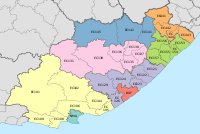Ntabankulu Local Municipality
Template:Infobox South African municipality Ntabankulu Local Municipality is an administrative area in the Alfred Nzo District of Eastern Cape in South Africa.
Ntabankulu is an isiXhosa name meaning "great or big mountain", since the municipal area is mountainous in character.[1]
It was formerly part of the OR Tambo District Municipality, but was transferred to the Alfred Nzo District Municipality after the 2011 municipal election.[2]
Main places
The 2001 census divided the municipality into the following main places:[3]
| Place | Code | Area (km2) | Population | Most spoken language |
|---|---|---|---|---|
| Amacwera | 23101 | 376.11 | 29,102 | Xhosa |
| Amanci | 23102 | 310.80 | 35,238 | Xhosa |
| Bala | 23103 | 3.83 | 271 | Xhosa |
| Fikeni | 23104 | 2.47 | 164 | Xhosa |
| Lwandlolubomvu | 23105 | 518.70 | 46,140 | Xhosa |
| Ntlenzi | 23106 | 124.41 | 12,586 | Xhosa |
| Tabankulu Town | 23108 | 11.40 | 2,169 | Xhosa |
| Tabankulu | 23107 | 0.84 | 61 | Xhosa |
| Xesibe | 23109 | 112.06 | 10,658 | Xhosa |
Politics
The municipal council consists of thirty-four members elected by mixed-member proportional representation. Seventeen councillors are elected by first-past-the-post voting in seventeen wards, while the remaining seventeen are chosen from party lists so that the total number of party representatives is proportional to the number of votes received. In the election of 3 August 2016 the African National Congress (ANC) won a majority of twenty-nine seats on the council. The following table shows the results of the election.[4][5]
style="width: 2px; color:inherit; background-color: #006600;" data-sort-value="African National Congress" | style="width: 2px; color:inherit; background-color: #852A2A;" data-sort-value="Economic Freedom Fighters" | style="width: 2px; color:inherit; background-color: #005BA6;" data-sort-value="Democratic Alliance (South Africa)" | style="width: 2px; color:inherit; background-color: #ffb543;" data-sort-value="African Independent Congress" | style="width: 2px; color:inherit; background-color: #FFB300;" data-sort-value="United Democratic Movement" | style="width: 2px; color:inherit; background-color: #DCDCDC;" data-sort-value="Independent (politics)" | style="width: 2px; color:inherit; background-color: lightgrey;" data-sort-value="Abantu Democratic Revolution" || Party | Votes | Seats | ||||||
|---|---|---|---|---|---|---|---|---|
| Ward | List | Total | % | Ward | List | Total | ||
| ANC | 29,115 | 28,038 | 57,153 | 85.1 | 17 | 12 | 29 | |
| EFF | 1,924 | 1,778 | 3,702 | 5.5 | 0 | 2 | 2 | |
| DA | 1,819 | 1,735 | 3,554 | 5.3 | 0 | 2 | 2 | |
| AIC | 284 | 1,347 | 1,631 | 2.4 | 0 | 1 | 1 | |
| UDM | 15 | 391 | 406 | 0.6 | 0 | 0 | 0 | |
| Independent | 400 | – | 400 | 0.6 | 0 | – | 0 | |
| Abantu Democratic Revolution | 166 | 141 | 307 | 0.5 | 0 | 0 | 0 | |
| Total | 33,723 | 33,430 | 67,153 | 100.0 | 17 | 17 | 34 | |
| Spoilt votes | 769 | 880 | 1,649 | |||||
References
- ^ South African Languages - Place names
- ^ "MFMA Circular No. 54: Municipal Budget Circular for the 2011/12 MTREF" (PDF). National Treasury. 10 December 2010. p. 5. Retrieved 23 March 2011.
- ^ Lookup Tables - Statistics South Africa
- ^ "Results Summary – All Ballots: Ntabankulu" (PDF). Independent Electoral Commission. Retrieved 22 December 2016.
- ^ "Seat Calculation Detail: Ntabankulu" (PDF). Independent Electoral Commission. Retrieved 22 December 2016.

